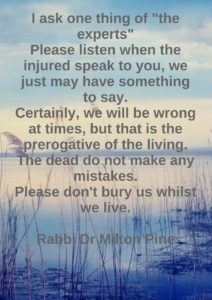
‘Changed Lives New Journeys’.
The name for me reflects what I heard in many conversations about life changes after brain injury.
Both from people living with brain injury and their families.
Life changes in so many ways. I was reminded of this when I read an article by Wolfgang Wolf on his blog “The glass is half full √”. The title itself speaks volumes: “I used to drive a BMW, now I get around in a wheelchair”.
I am grateful that Wolfgang has given permission to reprint this article in full here. You can visit his blog for more “The glass is half full √” or contact him direct. (See details at the end of the article below).
Brain injury, including Stroke, are unpredictable events and they change lives in many ways. The article below by Wolgang expands on life changes, giving firsthand experience of the change that happens after an unpredicatable event, such as a Stroke.
I used to drive a BMW, now I get around in a wheelchair.
Wolfgang Wolf
30/03/2014
There are two kinds of change – voluntary and involuntary change. Whereby voluntary, means “with our consent”. Celebrating a long awaited promotion, tying the knot, buying a house, our children’s wedding, the birth of our grandchildren, retirement, etc.. They are the happy occasions.
On the other hand are the not so pleasant changes. Those with a sudden onset, like accidents, or acquired illnesses.
The positive changes, even though we can prepare and plan for them, can create a fair amount of stress. Imagine the disarray we are thrown into if an unexpected change is forced upon us. We just don’t like change. Usually it is not until something serious happens that we reluctantly deal with it, and only because we have to. Up till then we build our “nest”, our comfort zone. We all do, and we do not like to leave it. Because beyond the comfort zone is the panic zone. In fact, ca. 80% of people live their life within their comfort zone.
A stroke is one such unexpected change that throws us out off our comfort zone, and forces us to deal with a new situation. Of course we have to give up some material things. Actually, the more we give up, the better it is. Because it helps our rehabilitation. The most important step of rehabilitation is to leave the “old” life behind, and build a “new” one.
It starts some time during the hospital stay. Every stroke victim has to admit that a major disturbance has happened to his or her body. A disturbance that has a major effect on their life. In fact, their life will never be the same again. Some will spend the rest of their days connected to a respirator, others won’t ever be able to talk again, others won’t walk.
This is the time when we are confronted with a truth we don’t want to accept. Most stroke victims find that accepting that something is wrong is the most difficult part. For me – it slowly dawned on me that I had lost a lifestyle. I had to exchange my BMW for a wheel-chair, my comfortable pay packet for handouts.
Many live in denial for weeks, yes months. No matter how much we used our body, whether someone was athletic, or a couch potato, there is still a sense of loss, because one enjoyed a non-competitive walk along the beach, while the other equally enjoyed a walk to the fridge to get another beer.
If you’ve had a stroke, that’s too bad, but it is absolutely no reason to feel sorry for yourself. You can’t blame anyone else, and you can’t say that everyone else is better off. Because they are not – at least not necessarily. They maybe are, physically. But emotionally? Our emotional wellbeing is governed by the interaction with other people, that is caregivers, visitors, the postman, etc., any social contact we might have.
Isn’t it up to us to make this social interaction a positive experience? So, one could say: “The good thing about a stroke (at least, sort of) is that we are in control of building our “new” life, while already knowing what to avoid. This means we can become a better person, and make other people happy”.
Isn’t this what life is all about?
Life Changes After Brain Injury: What can you do as a supporter?
Wolfgang’s article has a focus on Stroke. Change is similar for other types of brain injury. If you are supporting a person with brain injury you can gain a lot from Wolfgang’s messages about change.
[unordered_list style=”green-dot”]
- Stand alongside and support people to build new lives. Try new things.
- Encouraging strengths and a positive approach – in a gentle, supportive, encouraging way.
- Avoid blaming and discourage a focus on blaming in others.
- Be aware of and sensitive to the losses that have occurred and may continue to happen.
- Listen – yes I know it seems to be my number one go to strategy for everything. Well yes it pretty much is.
[/unordered_list]
What other lessons have you learned from Wolfgang’s article?
And Finally
As a supporter we often feel compelled to DO something. To solve the problem.
Often taking time to listen and reflect back what you are hearing can help the other person work out the steps for themselves. At the very least to feel heard is important.
If you would like to read more of Wolfgang’s work or get in touch with him. Here are some ways to contact him:
- Wolfgang is the author of “How to Survive after a Stroke” available on Amazon.
- You can visit his blog “The glass is half full √”
- Or email direct: wolfgangwolf@xtra.co.nz


